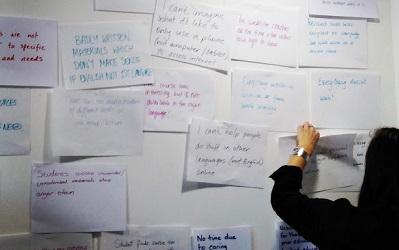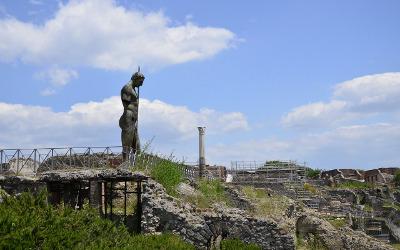You are here
- Home
- Year of Mygration
- Day 205, Year of #Mygration: OU research project highlights the barriers stopping refugees & asylum seekers from learning
Day 205, Year of #Mygration: OU research project highlights the barriers stopping refugees & asylum seekers from learning

Today’s post is written by OU alumna Heidi McCafferty, whose ethical consultancy firm, successfully bid to manage the OU’s Year of Mygration earlier this year. Heidi discusses the aims of Refugees' Educational Resources, a project led by OU Scotland, and summarises a recent practitioner-focused workshop held in Glasgow.
The Year of Mygration initiative was launched in January to highlight OU activity relating to issues affecting migrants, refugees and asylum seekers. In the process it has demonstrated how migration is interwoven into every aspect of UK society, politics and culture and, indeed, how this has been the case for centuries. Although – as the largest university in the UK – nearly everyone knows someone who has studied with the OU, disappointingly it remains less well known for its work around global migration, which is why I was so delighted to be tasked with managing this exciting initiative. A key responsibility has been that of publishing fresh, engaging content every single day, which has certainly been a lot of work but, with the exceptional support of Dr Fidèle Mutwarasibo and Dr Craig Walker, has enabled us to disseminate insights from over 100 key OU staff and partners.
As part of the overarching initiative, OU Scotland has developed the Refugees’ Educational Resources (RefER) project, which supports practitioners working with refugees and asylum seekers. Due to the extremely tight timescale for delivery, the OU brought in online education consultant Gabi Witthaus, the director of Art of E-learning, and Alastair Creelman, an e-learning specialist at Linnaeus University, Sweden, to conduct an evaluation of the free, online learning resources available to refugees and asylum seekers in the UK and to those who support them. Over 100 surveys were sent out and dozens of in-depth interviews conducted and, on Friday 28th September, OU Scotland held a workshop in Glasgow to showcase the results.
At the workshop, attended by representatives from organisations including Forth Valley Welcome, Single Homeless Project (SHP), Community Infosource, Perth College UHI, Together for Better Life and the University of York, Gabi discussed some of the issues around using mobile phones for learning (such as internet access and low-tech handsets) and shared key findings, which included:
- current resources are often in complicated English
- materials can reveal a cultural bias
- content is aimed at too low or too high a learning level
- refugees and asylum seekers have reservations about learning online for fear of being monitored, deported or becoming victims of crime
- training opportunities for frontline staff are limited and, even when they are available, staff are exceptionally short on time, meaning that professional development is a struggle.
The OU’s potential role as curator of existing content or provider of translation, transcription or mobile-friendly versions of existing materials was explored, along with the possibility of creating a course to help refugees and asylum seekers use online learning resources and digital technologies. An alternative course, which would enable staff and volunteers who provide frontline support for refugees and asylum seekers to work together with them as “open learning champions” to create empowering learning pathways, materials and learning experiences, was also discussed.
Gabi led a range of activities in which participants discussed their dream scenario, which would include:
- vibrant learning centres
- recognition of prior learning
- mobile-friendly learning tools in multiple languages
- spaces designed to make those entering the UK feel welcome.
Participants then moved on to their nightmare scenario, which included:
- poorly written learning materials inaccessible to those with limited English
- content that cannot be viewed properly on a mobile phone
- culturally insensitive or inaccurate content, which serves to perpetuate a learning environment in which students feel more isolated than before.
After lunch, Gabi and the OU Scotland team began gathering feedback on key gaps. Forth Valley Welcome expressed the need for ESOL (English for Speakers of Other Languages) materials to support their volunteers in helping refugees and asylum seekers, along with IT skills that would allow users to navigate online resources. This, however, was challenged by a member of SHP, who asked why English is often described as ‘the gap’. This led to a consensus that mother tongues should be seen as assets rather than something that needs to be replaced, and the question was reframed to become ‘How can we build on the existing skills and experience of refugees and asylum seekers, and weave English skills into these?’
Mother tongues should be seen as assets rather than something that needs to be replaced
The consequences of excluding the expertise of many refugees and asylum seekers was discussed, with examples given of experienced senior accountants from Syria being expected to wash dishes after entering the UK as refugees simply because they were trained in an Arabic rather than an English software system. The importance of teaching refugees internet literacy and to become critical learners was also highlighted, along with the fact that refugees or asylum seekers with pedagogical expertise are not being granted opportunities to develop learning content themselves.
As was to be expected, the workshop – described by participants as ‘inspiring’, ‘thought-provoking’, ‘dynamic’, ‘engaging’ and ‘pragmatic’ – produced more questions than answers. However, it will help the OU to ensure that its future interventions are entirely demand-driven, place impact at their core, and are able to make a tangible difference to those who engage with them. A full report outlining the key findings from the interviews, surveys and workshop will be published next month and the workshop group will reconvene in the coming months to progress the key ideas raised.
If you would like to feed into these discussions, please do not hesitate to get in touch.
Quarterly Review of Research
Read our Quarterly Review of Research to learn about our latest quality academic output.

Contact our news team
For all out of hours enquiries, please telephone +44 (0)7901 515891
